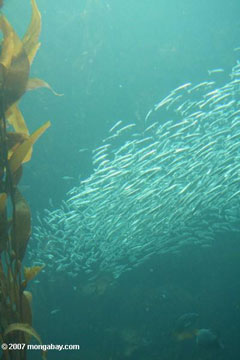The global rich are eating the poor’s fish: new report shows tropical fish catch gravely under-estimated
The global rich are eating the poor’s fish: new report shows tropical fish catch gravely under-estimated
Jeremy Hance, mongabay.com
July 11, 2008
|
|
After a week of bad news regarding marine life — it was reported that half of U.S. coral reefs are in fair to poor condition and one-third of all coral species are threatened globally — there is still more: a study of twenty tropical islands showed that recreational and subsistence fishing has gone almost completely unreported from 1950 to 2004. In fifteen of twenty cases the fish take was at least doubled when local fish catches were added, and in the most extreme case, American Samoa, the amount of fish collected was 17 times what was previously recorded.
“The underreporting is of such magnitude that it boggles the mind,” the head of the study, Daniel Pauly, said.
The reason for the large gaps in data is that the United Nations’ Food and Agriculture (FAO) does most of its data collecting on fish that is traded. In other words, any fish that is caught and brought home by the fisher goes unrecorded.

|
The new statistics have widespread environmental, economic, and social implications. Firstly, the island nations studied have been selling fishing rights to large commercial fisheries–which ship to wealthy nations–based on wildly inaccurate data. In effect, commercial fisheries have been able to harvest volumes of fish that are far above sustainability. It also means that the number of fish left for poor families who depend on them for subsistence is diminishing even faster than predicted.
“This is the antithesis of the Robin Hood parable. Instead of stealing from the rich to give to the poor, we’re stealing from the poor to give to the rich,” Jennifer Jacquet, one of the researchers on the study, said. For many of these island countries locally-caught fish is an invaluable source of protein.
The researchers argue that in order to have reasonable management plans for the world’s marine life, better estimates of global fishing need to become a priority.
The study, undertaken by scientists from the Sea Around Us Project, was presented at the 11th International Coral Reef Symposium in Fort Lauderdale, Florida.